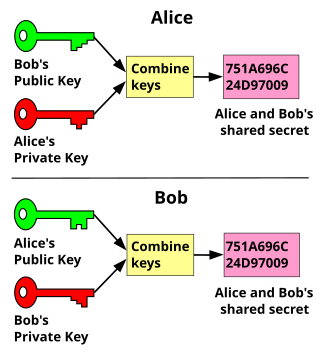
Konqueror is a free and open-source web browser and file manager that provides web access and file-viewer functionality for file systems. It forms a core part of the KDE Software Compilation. Developed by volunteers, Konqueror can run on most Unix-like operating systems. The KDE community licenses and distributes Konqueror under GNU GPL-2.0-or-later.
FileVault is a disk encryption program in Mac OS X 10.3 (2003) and later. It performs on-the-fly encryption with volumes on Mac computers.

Konsole is a free and open-source terminal emulator graphical application which is part of KDE Applications and ships with the KDE desktop environment. Konsole was originally written by Lars Doelle. It ls licensed under the GPL-2.0-or-later and the GNU Free Documentation License.

Key exchange is a method in cryptography by which cryptographic keys are exchanged between two parties, allowing use of a cryptographic algorithm.
The Encrypting File System (EFS) on Microsoft Windows is a feature introduced in version 3.0 of NTFS that provides filesystem-level encryption. The technology enables files to be transparently encrypted to protect confidential data from attackers with physical access to the computer.
In cryptography and computer security, self-signed certificates are public key certificates that are not issued by a certificate authority (CA). These self-signed certificates are easy to make and do not cost money. However, they do not provide any trust value.
XMLGUI is a KDE framework for designing the user interface of an application using XML, using the idea of actions.

Kontact is a personal information manager and groupware software suite developed by KDE. It supports calendars, contacts, notes, to-do lists, news, and email. It offers a number of inter-changeable graphical UIs all built on top of a common core.
A file-hosting service, also known as cloud-storage service, online file-storage provider, or cyberlocker is an internet hosting service specifically designed to host user files. These services allows users to upload files that can be accessed over the internet after providing a username and password or other authentication. Typically, file hosting services allow HTTP access, and in some cases, FTP access. Other related services include content-displaying hosting services, virtual storage, and remote backup solutions.

KDE Software Compilation 4 was the only series of the so-called KDE Software Compilation, first released in January 2008 and the last release being 4.14.3 released in November 2014. It was the follow-up to K Desktop Environment 3. Following KDE SC 4, the compilation was broken up into basic framework libraries, desktop environment and applications, which are termed KDE Frameworks 5, KDE Plasma 5 and KDE Applications, respectively.

Kicker is the main panel used in KDE 3 and earlier, and also in the TDE desktop. Together with KDesktop, it forms the graphical shell. It can be customized by the user. By default, it has the K Menu, a Desktop Access button, a Home button, a Konqueror button, a Kontact button, and a Help button. It also has the Desktop Preview & Pager, the Taskbar, the System Tray, and the Clock.

KDE Platform 4 was a collection of libraries and software frameworks by KDE that served as technological foundation for KDE Software Compilation 4 distributed under the GNU Lesser General Public License (LGPL). KDE Platform 4 was the successor to KDElibs and the predecessor of KDE Frameworks. KDE Platform 4 is the only version of KDE Platform, and in 2013 it was replaced by KDE Frameworks 5.

Dolphin is a free and open source file manager included in the KDE Applications bundle. Dolphin became the default file manager of the KDE Plasma desktop environments in the fourth iteration, termed KDE Software Compilation 4. It can also be optionally installed on K Desktop Environment 3. It replaces Konqueror as the default file manager for KDE SC 4, but Konqueror can still be used as an alternative file manager.
Email encryption is encryption of email messages to protect the content from being read by entities other than the intended recipients. Email encryption may also include authentication.
Strigi was a file indexing and file search framework adopted by KDE SC. Strigi was initiated by Jos van den Oever. Strigi's goals are to be fast, use a small amount of RAM, and use flexible backends and plug-ins. A benchmark as of January 2007 showed that Strigi is faster and uses less memory than other search systems, but it lacks many of their features. Like most desktop search systems, Strigi can extract information from files, such as the length of an audio clip, the contents of a document, or the resolution of a picture; plugins determine what filetypes it is capable of handling. Strigi uses its own Jstream system which allows for deep indexing of files. Strigi is accessible via Konqueror, or by clicking on its icon, after adding it to KDE's Kicker or GNOME Panel. The graphical user interface (GUI) is named Strigiclient.

KDE Wallet Manager (KWallet) is free and open-source password management software written in C++ for UNIX-style operating systems. KDE Wallet Manager runs on a Linux-based OS and Its main feature is storing encrypted passwords in KDE Wallets. The main feature of KDE wallet manager (KWallet) is to collect user's credentials such as passwords or IDs and encrypt them through Blowfish symmetric block cipher algorithm or GNU Privacy Guard encryption.

K Desktop Environment 3 is the third series of releases of the K Desktop Environment. There are six major releases in this series. After the release of KDE 4, version 3.5 was forked into the Trinity Desktop Environment.

KeRanger is a ransomware trojan horse targeting computers running macOS. Discovered on March 4, 2016, by Palo Alto Networks, it affected more than 7,000 Mac users.

OpenKeychain is a free and open-source mobile app for the Android operating system that provides strong, user-based encryption which is compatible with the OpenPGP standard. This allows users to encrypt, decrypt, sign, and verify signatures for text, emails, and files. The app allows the user to store the public keys of other users with whom they interact, and to encrypt files such that only a specified user can decrypt them. In the same manner, if a file is received from another user and its public keys are saved, the receiver can verify the authenticity of that file and decrypt it if necessary. As of August 2021, it is no longer actively developed.

Jigsaw is a form of encrypting ransomware malware created in 2016. It was initially titled "BitcoinBlackmailer", but later came to be known as "Jigsaw" due to featuring an image of Billy the Puppet from the Saw film franchise. The malware encrypts computer files and gradually deletes them, demanding payment of a ransom to decrypt the files and halt the deletion.











